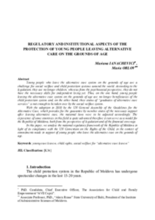Abstract
Young people who leave the alternative care system on the grounds of age are a challenge for social welfare and child protection systems around the world. According to the legislation, they are no longer children, whereas from the psychosocial perspective, they do not have the necessary skills for independent living yet. Thus, on the one hand, young people leaving the alternative care system on the grounds of age are no longer beneficiaries of the child protection system and, on the other hand, their status of “graduates of alternative care services” is not enough to be taken over by the social welfare system. With the adoption in 2010 by the UN General Assembly of the Guidelines for the Alternative Care, which provides for the guarantee by member states of the necessary support after leaving alternative care, the national laws were to be adjusted accordingly. The experience of some countries in this field is quite advanced therefore it can serve as a model for the Republic of Moldova, both from the perspective of legislation and of the financial coverage. In this paper, we analyze the national regulatory framework of the Republic of Moldova in light of its compliance with the UN Convention on the Rights of the Child, in the context of commitments made in support of young people who leave the alternative care on the grounds of age.

